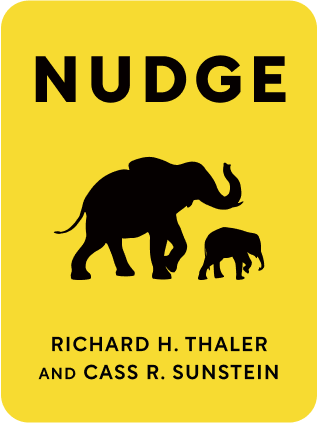

This article is an excerpt from the Shortform summary of "Nudge" by Richard H. Thaler and Cass R. Sunstein. Shortform has the world's best summaries of books you should be reading.
Like this article? Sign up for a free trial here .
What are some examples of nudge campaigns? When were nudges needed and what did they hope to accomplish.
There are examples of nudge campaigns in a variety of settings. The key across these campaigns is understanding the timing and scenarios best suited for nudging.
Read about the examples of nudge campaigns for each situation.
When to Nudge: Examples of Nudge Campaigns
To align with the values of Libertarian Paternalism, choice architects must design their nudges to help as much as possible and harm as little as possible. There are also particular kinds of decisions that warrant nudges more than others. See the examples of nudge campaigns that could apply in each of the situations below.
Rare and Difficult Decisions
The first situation wherein a nudge may be vital is when we’re faced with an abnormal or abnormally difficult decision. Saving for retirement, buying a house, or choosing a college are each monumental decisions that come around once or rarely in a lifetime. Thus, they’re prime candidates for nudges. Examples of nudges for these situations would be the ones that help present information in a manageable way, like the RECAP system.
Examples of Nudge Campaigns for Delayed Feedback
For many decisions, we get immediate feedback on our choices. When we use our debit card to buy a gift for a loved one, we see the consequences of that choice reflected almost instantaneously on our account statement.
For other decisions, however, the feedback on our choices is delayed or obscure. For example, someone can eat poorly and/or smoke for years and experience no negative effects—until the day he or she suffers a stroke. Nudges can help us make better decisions in situations like these, when the consequences of our actions aren’t immediately apparent. For example, a reminder on every pack of cigarettes about the risk of smoking may deter this behavior.
Decisions Requiring Specialized Knowledge
Many of the most important decisions we’re faced with—choosing a retirement or health care plan, for example—are presented to us using specialized terms that can confuse more than inform. Most of us—unless we work in finance—would be at a loss when faced with options like “capital appreciation” or “dynamic dividend” funds. Given especially complex and unpredictable options, nudges can be vital to provide information or to default to a good choice. For example, defaulting into enrollment for a health care plan or retirement contibution.

———End of Preview———
Like what you just read? Read the rest of the world's best summary of Richard H. Thaler and Cass R. Sunstein's "Nudge" at Shortform .
Here's what you'll find in our full Nudge summary :
- Why subtle changes, like switching the order of two choices, can dramatically change your response
- How to increase the organ donation rate by over 50% through one simple change
- The best way for society to balance individual freedom with social welfare






